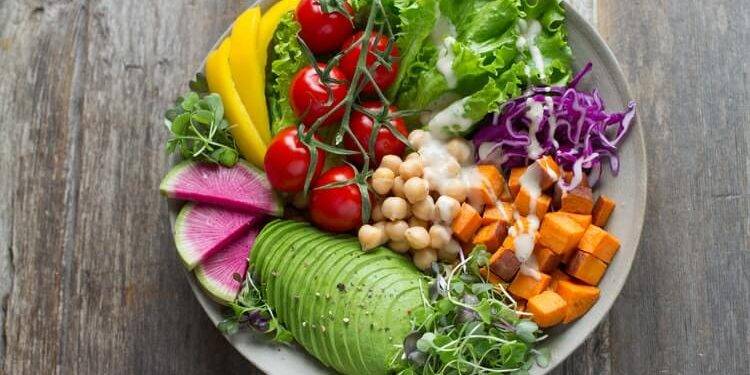You May Lose Weight With a Vegan Diet
Like with practically any other diet, it is unquestionably possible to lose weight on a vegan diet if your calorie intake is lower than your daily calorie expenditure.
Because plant-based foods are more satiating in terms of volume than animal products, vegan diets are typically highly helpful for losing weight.
In comparison to meals like cheese, meat, and eggs, vegetables, fruits, and legumes include a lot of water and fiber.
Because animal foods have a much higher caloric density than many vegan diets, it is easier to feel satisfied with fewer calories. By switching to a vegan diet, the majority of people see significant weight loss as long as they prioritize whole, unprocessed foods.Lets read the benefits of a vegan diet below;
Blood Pressure May Be Decreased by a Vegan Diet
Blood pressure can be lowered with the aid of antioxidants, minerals like potassium, and nitrates contained in fruits and vegetables.
According to studies, people who switch to a vegan diet experience significantly lower systolic and diastolic blood pressure. Several studies show that vegans have a 75% lower risk of developing hypertension than omnivores.
You May Have a Reduced Risk of Cardiovascular Disease If You Eat Vegan
A vegan diet can assist in lowering cholesterol and blood pressure. The majority of research demonstrates a decrease in both total cholesterol levels and “bad” LDL cholesterol.
Furthermore, compared to omnivorous diets, longitudinal studies have indicated that vegans have a lower incidence of heart disease, stroke, and atherosclerosis.
Keep in mind that food quality is the most important factor in obtaining health advantages.
It is technically feasible to consume a lot of processed junk food and snacks and still remain vegan. The goal is to eat as many whole foods in their unaltered forms as you can. Examples include fruits, vegetables, legumes, nuts, and seeds.
A vegan diet is rich in antioxidants.
The majority of plant-based diets are rich in antioxidants, and this includes soy, berries, vegetables, seeds, and legumes.
Anthocyanins, antioxidants present in purple and blue foods such as blueberries, red cabbage, blackberries, and others, have been shown to lower cholesterol, reduce inflammation, enhance cognitive function, and lower the risk of cancer.
Procyanidins and flavonoids, two polyphenols that have been linked to improved mood, cognition, memory, and learning, are also present in them.
A vegan diet is good for your digestive system.
The high fiber content of the vegan diet encourages good digestion and may alleviate constipation.
The good bacteria in your stomach aid digestion by breaking down fiber and large macronutrients into nutrients that can be absorbed.
Also, they produce crucial vitamins like B12 and K that help with sickness and infection prevention.
These beneficial bacteria are supported by prebiotic fiber-rich plant foods, whereas detrimental bacteria are encouraged by animal-based foods.
A diet high in meat, dairy, cheese, and eggs may disrupt your gut flora and cause bacterial imbalances as a result (known as symbiosis). This can lead to indigestion, bloating, weight gain, obesity, inflammation, skin ailments, and digestive issues.
Since they are high in antioxidants and low in inflammatory substances like processed oils and saturated fats, plant-based foods are the best sources of anti-inflammatory nutrients.
Limit your intake of added sugars to maximize the anti-inflammatory effects of a vegan diet. Omega-3 fatty acids, which are also present in flaxseeds, pecans, walnuts, algae or seaweed, and chia seeds, can also assist to lower inflammation.
You May Improve Insulin Sensitivity and Blood Sugar Management with a Vegan Diet
It has been demonstrated that a vegan diet lowers blood sugar levels and improves insulin sensitivity, hence reducing the incidence of type 2 diabetes.
This is mainly because of a high intake of fiber, vegetables, and complex carbohydrates with a low glycemic index, like legumes and root vegetables, which are rich in resistant starch. Moreover, vegan diets are low in saturated fat, which has been associated with elevated blood sugar.
A Vegan Diet May Reduce Cancer Risk
Anti-inflammatory antioxidants and phytonutrients are abundant in a vegan diet. Including a wide variety of foodstuffs, including fruits, vegetables, grains, and legumes, as well as a variety of beverages, including coffee, tea, and alcoholic beverages.
Antioxidants have anti-inflammatory capabilities, decrease tumor genes, and shield the body from oxidative damage. As a result, a vegan diet has been associated with a number of illnesses, including breast cancer, colon cancer, stomach cancer, and prostate cancer.
The Environment Benefits from a Vegan Diet
As opposed to secondary consumers, vegans are primary consumers. So, compared to omnivorous diets, the vegan diet utilizes significantly less water and natural resources, and its carbon impact is significantly smaller.
There is only one planet, and many of the decisions we make are rapidly depleting natural resources and harming the earth.
Veganism protects animals from harm.
Many people who choose for a vegan diet do so out of compassion for animals. Given the questionable methods prevalent in the meat, dairy, and egg sectors, many vegans agree with the idea of preserving animal life through their dietary choices.













